- Home
- William Gibson
Zero History Page 7
Zero History Read online
Page 7
He sipped his latte, looking out, watching people pass, wondering if he could see the French girl’s thesis proven in the garments of this morning’s pedestrians. If you thought of it as a kind of pervasive subtext, he decided, you could.
“Excuse me. Would you mind if I shared the table?”
Milgrim looked up at this smiling American, ethnically Chinese, in her black sweatshirt, a small plain gold cross, gold-chained, worn atop it, one white plastic barrette visible, as some unsleeping module of addict street-alertness, hardwired to his very core, crisply announced: cop.
He blinked. “Of course. You’re welcome.” Feeling muscles in his thighs bunching, tight, readying themselves for the dash out the door. Malfunction, he told the module. Post-acute withdrawal syndrome. Flashback: His limbic brain was grooved for this, like the tracks of the wheels of Conestoga wagons, worn ankle-deep in sandstone.
She put her sacklike white pleather purse on the table, her plastic-lidded pale blue Caffè Nero cup beside it, pulled out the chair opposite him, and sat. Smiled.
Embroidered in white, on the black sweatshirt, were the crescent moon and palm tree of the South Carolina state flag, a bit larger than one of Ralph Lauren’s polo ponies. Milgrim’s buried module instantly extruded an entire DEW line of arcane cop-sensing apparatus.
Paranoia, his therapist had told him, was too much information. He had that now as the woman dipped into her purse, brought up a matte silver phone, opened it, and furrowed her brow. “Messages,” she said.
Milgrim looking straight into the infinitely deep black pupil that was the phone’s camera. “Uh-oh,” she said, “I see I have to run. Thanks anyway!” And up, purse under her arm, and out into Seven Dials.
Leaving her drink.
Milgrim picked it up. Empty. The white lid smudged with a dark lipstick she hadn’t been wearing.
Through the window he saw her pass an overflowing trash canister, from which she’d likely plucked this cup for her prop. Quickly crossing the intersection, toward Sassoon. Vanishing around a corner.
He stood, straightening his jacket, and walked out, not looking around. Back up Monmouth Street, toward his hotel. As he neared it, he crossed Monmouth diagonally, still moving at a calculatedly casual pace, and entered a sort of brick tunnel that led to Neal’s Yard, a courtyard gotten up as a kind of New Age mini-Disneyland. He bolted through this so quickly that people looked after him. Out into Shorts Garden, another street.
Purposeful pace now, but nothing to attract attention.
All the while aware of his addiction, awakened by the flood of stress chemicals, urgently advising him that something to take the edge off would be a very good idea indeed. It was, some newer part of him thought, amazed, like having a Nazi tank buried in your back yard. Grown over with grass and dandelions, but then you noticed its engine was still idling.
Not today, he told the Nazis in their buried tank, heading for Covent Garden tube station through an encyclopedic anthology of young people’s shoe stores, spring’s sneakers tinted like jelly beans.
Not good, another part of him was saying, not good.
As much as he wished to appear relaxed, the usual crew of beggars, floating in solution on the pavement in front of the station, faded at his approach. They saw something. He had again become as they were.
He saw Covent Garden as if from a great height, the crowd in Long Acre drawing back from him like magnetized iron filings.
Take the stairs, advised the autonomic pilot. He did, head down, never looking back, a unit in the spiral human chain.
Next he’d take the first train to Leicester Square, the shortest journey in the entire system. Then back, without exiting, having assured himself he wasn’t being followed. He knew how to do that, but then there were all these cameras, in their smoked acrylic spheres, like knockoff Courrèges light fixtures. There were cameras literally everywhere, in London. So far, he’d managed not to think about them. He remembered Bigend saying they were a symptom of autoimmune disease, the state’s protective mechanisms ’roiding up into something actively destructive, chronic; watchful eyes, eroding the healthy function of that which they ostensibly protected.
Did anyone protect him now?
He took himself through what one did in order to determine that one wasn’t being followed. While he did so, he anticipated his immediate return to this station. Imagined his ascent in the elevator’s dead air, where a dead voice would repeatedly advise him to have his ticket or pass ready.
He would be calmer, then.
Then restart the day, as planned. Go to Hackett in King Street, buy pants and a shirt.
Not good, said the other voice, causing his shoulders to narrow, bone and sinew tightening almost audibly.
Not good.
11. UNPACKING
Heidi’s room looked like the aftermath of a not-very-successful airplane bombing. Something that blew open every suitcase in the luggage compartment without bringing the plane down. Hollis had seen this many times before, touring with the Curfew, and took it to be a survival mechanism, a means of denying the soulless suction of sequential hotel rooms. She’d never actually seen Heidi distribute her things, nest-build. She guessed it was unconscious, accomplished in the course of an instinctive trance, like a dog walking tight circles in grass before it lay down to sleep. She was impressed now, to see how effectively Heidi had created her own space, pushing back whatever it was that Cabinet’s designers had intended the room to express.
“Fuck,” said Heidi, ponderously, apparently having slept, or passed out, in her Israeli army bra. Hollis, who had taken the key with her when she’d left, saw that there was barely a finger of whiskey left in the decanter. Heidi didn’t drink often, but when she did, she did. She lay now under a wrinkled pile of laundry, including, Hollis saw, several magenta linen table napkins and a cheap Mexican beach towel striped like a serape. Apparently Heidi had dumped the contents of the laundry hopper at Chez Fuckstick into one of her bags, departing, then pulled it out here. It was this she’d slept under, not Cabinet’s bedclothes.
“Breakfast?” Hollis began picking up and sorting the things on the bed. There was a large freezer-bag full of small, sharp-looking tools, fine-tipped brushes, tiny tins of paint, bits of white plastic. As if Heidi had adopted a twelve-year-old boy. “What’s this?”
“Therapy,” Heidi croaked, then made a sound like a vulture about to bring up something too putrid to digest, but Hollis had heard it before. She thought she remembered who Heidi had learned it from, a supernaturally pale German keyboardist with prematurely aged tattoos, their outlines blurred like felt pen on toilet paper. She put the bag and its mysterious contents on the dresser and picked up the phone, French, early twentieth century, but covered entirely in garishly reptilian Moroccan beading, like the business end of a hookah in the Grand Bazaar. “Pot of coffee, black, two cups,” she said to the room service voice, “rack of dry toast, large orange juice. Thanks.” She removed an ancient Ramones T-shirt from what was then revealed as a foot-tall white china reflexology model, an ear, complexly mapped in red. She put the T-shirt back, arranging it so that the band’s logo was optimally displayed.
“What about you?” asked Heidi, from beneath her laundry.
“What about me?”
“Men,” said Heidi.
“None,” said Hollis.
“What about the performance artist. Jumped off skyscrapers wearing that flying-squirrel suit. He was okay. Hot, too. Darrell?”
“Garreth,” said Hollis, probably for the first time in over a year, not wanting to.
“Is that why you’re here? He was English.”
“No,” said Hollis. “I mean yes, he was, but that’s not why I’m here.”
“You met him in Canada. Bigend introduce you? I didn’t meet him till later.”
“No,” Hollis said, dreading Heidi’s skill at this other, more painful unpacking. “They never met.”
“You don’t do jocks,” said Heidi.
“H
e was different,” said Hollis.
“They all are,” said Heidi.
“Was fuckstick?”
“No,” said Heidi. “Not that way. That was me, trying to be different. He was as undifferent as you can get, but he was somebody else’s undifferent. I just had this feeling that I could step into somebody else’s shoes. Put all the tour stuff in boxes. Shop at malls. Drive a car I’d never have thought of driving. Get a fucking break, you know? Time-out.”
“You didn’t seem very happy with it, when I saw you in L.A.”
“He turned out to be a closet creative. I married a tax lawyer. He started trying to produce. Indie stuff. He was starting to mention directing.”
“And he’s in jail now?”
“No bond. We had the FBI in the office. Wearing those jackets with ‘FBI’ on the back. They looked really good. Great look for a small production. But he couldn’t be on the set.”
“But you’re okay, legally?”
“I had Inchmale’s lawyer, in New York. I won’t even lose the share of his legitimate property I’m entitled to as the ex. Should they leave him any, which is unlikely. But seriously, fuck it.”
Breakfast arrived, Hollis taking the tray from the Italian girl at the door, with a wink. Tip her later.
Heidi batted her way out of the laundry pile. Sat on the edge of the bed, pulling on an enormous hockey jersey which Hollis, born without the gene for following team sports, recalled as having belonged to someone quite famous. Heidi definitely did jocks, though only if they were sufficiently crazy. Drumming for the Curfew, she’d had a spectacularly bad string of boxers, however good it might have been for publicity. She’d put one of them out cold with a single punch, at a pre-Oscars party. Very frequently now, Hollis was grateful for having had a pre-YouTube career.
“I never got what he did, Garret,” said Heidi, pouring herself half a cup of coffee, then topping it up with what remained in the whiskey decanter.
“Garreth. Do you think that’s a good idea?”
Heidi shrugged, her shoulders almost lost within the jersey. “You know me. Get this down and I’m good for six months of mineral water. Actually what I need now’s a gym. Serious one. What did he do?”
“I’m not sure I could explain that,” Hollis said, pouring her own coffee. “But I made a very firm agreement never to try.”
“Crook?”
“No,” said Hollis, “though some of what he did involved breaking laws. You know Banksy, the graffiti artist?”
“Yeah?”
“He liked Banksy. Identified with him. They’re both from Bristol.”
“But he wasn’t a graffiti artist.”
“I think he thought he was. Just not with paint.”
“With what?”
“History,” said Hollis.
Heidi looked unconvinced.
“He worked with an older man, someone with a lot of resources. The old man decided what should be done, what the gesture would be, then Garreth worked out the best way to do it. And not get caught. Dramaturge to the old man’s playwright, sort of, but sometimes actor as well.”
“So what was the problem?”
“Scary. Not that I didn’t approve of what they were doing. But it was scarier than Bigend’s stuff. I need the world to have a surface, the same surface everyone sees. I don’t like feeling like I’m always about to fall through, into something else. Look what happened to you.”
Heidi picked up a triangle of dry toast, considering it the way a potential suicide might consider a razor. “You said they weren’t crooks.”
“They broke laws, but they weren’t crooks. But by the very nature of what they did, they constantly made enemies. He came to L.A., we hung out. I was starting the book. He went back to Europe. Saw him again when I was over here to sign the car contract.”
“I got a proxy.” Biting off a corner of toast, chewing it dubiously.
“I wanted to be here.” Hollis smiled. “Then he came back with me, to New York. He wasn’t working. But then they were gearing up again. It was the run-up to Obama’s election. They were getting ready to do something.”
“What?”
“I don’t know. If I did, and kept my promise, I couldn’t tell you anyway. I just got really busy with the book. He wasn’t around as much. Then he just wasn’t around.”
“Miss him?”
Hollis shrugged.
“You’re a difficult fit, you know that?”
Hollis nodded.
“Must make it harder.” Heidi got up, carried her whiskey and coffee into the bathroom, and splashed it into the sink. She came back and poured herself more coffee. “Feel like you’re on hold?”
“Definitely.”
“No good,” said Heidi. “Call him. See what’s up. Work through it.”
“No.”
“Got a number?”
“For emergencies. Only.”
“What kind?”
“Only if having known them ever got me into trouble.”
“Use it anyway.”
“No.”
“Pathetic,” said Heidi. “What the fuck is that?” She was staring into the bathroom.
“Your shower.”
“You’re kidding.”
“Wait’ll you see mine. What’s in those two boxes?” Pointing, where she’d put them down after taking them from Robert the night before. Hoping to change the topic. “A pair of concrete blocks?”
“Ashes,” Heidi said, “cremains.”
“Whose?”
“Jimmy’s.” The Curfew’s bass player. “There was nobody to claim them. He always said he wanted to be buried in Cornwall, remember?”
“No,” said Hollis. “Why Cornwall?”
“Fuck if I know. Maybe he’d decided it was the opposite of Kansas.”
“That’s a lot of ashes.”
“My mom’s too.”
“Your mother’s?”
“I never got around to doing anything with them. They were in the basement, with my tour stuff. I couldn’t leave ’em there with fuckstick, could I? I’ll take ’em both to Cornwall. Jimmy never had a mother anyway.”
“Okay,” said Hollis, unable to think of anything else to say.
“Where the fuck is Cornwall?”
“I can show you. On a map.”
“I need a fucking shower,” said Heidi.
12. COMPLIANCE TOOL
Bigend’s office, when Milgrim was finally ushered in, was windowless and surprisingly small. Perhaps it wasn’t that specifically his office, Milgrim thought. It didn’t look like an office anyone actually worked in.
The Swedish boy who’d brought Milgrim in put a gray folder on the teak desk and left silently. There was nothing else on the desk except a shotgun, one that appeared to have been made from solidified Pepto-Bismol.
“What’s that?” Milgrim asked.
“The maquette for one of the early takes on a collaboration between Taser and Mossberg, the shotgun manufacturer.” Bigend was wearing disposable plastic gloves, the kind that came on a roll, like cheap sandwich bags. “A compliance tool.”
“Compliance tool?”
“That’s what they call it,” said Bigend, picking the thing up with one hand and turning it, so that Milgrim could see it from various angles. It looked weightless. Hollow, some sort of resin. “I have it because I’m trying to decide whether a collaboration like this is the equivalent of Roberto Cavalli designing a trench coat for H&M.”
“I’ve been made,” said Milgrim.
“Made?” Bigend looked up.
“A cop took my picture this morning.”
“A cop? What kind?”
“A Chinese-American missionary-looking one. Her sweatshirt was embroidered with the South Carolina state flag.”
“Sit down,” said Bigend.
Milgrim sat, his Hackett shopping bag on his lap.
“How do you know she was a cop?” Bigend removed the glove-baggies, crumpled them.
“I just did. Do. Not necessar
ily in the sense of a law enforcement officer, but I wouldn’t put it past her.”
“You’ve been shopping,” said Bigend, looked at the Hackett bag. “What did you buy?”
“Pants,” said Milgrim, “a shirt.”
“Ralph Lauren shops at Hackett, I’m told,” said Bigend. “That’s an extremely complex piece of information, conceptually. Whether it’s true or not.” He smiled. “Do you like to shop there?”
“I don’t understand it,” Milgrim said, “but I like their pants. Some of their plainer shirts.”
“What don’t you understand?”
“The English football thing.”
“How so?”
“Are they serious about that, Hackett?”
“Exactly what I value in you. You go effortlessly to the core.”
“But are they?”
“Some would maintain that a double negative amounts to a positive. Where did this person take your picture?”
“Coffee place near the hotel. Seven Dials.”
“And you have informed—?”
“You.”
“Don’t mention this to anyone else. Except Pamela. I’ll inform her.”
“Not Oliver?”
“No,” said Bigend, “definitely not Oliver. Have you spoken with him today?”
“He had me leave my phone in the room, charging and turned on. He said that he needed to reprogram it. I haven’t gone back there yet.”
Bigend stared at the pink shotgun.
“Why is it that pink?” asked Milgrim.
“Output from a 3-D printer. I don’t know why they use pink. Seems to be the default shade. Those phones are an Oliver project. When you use one, you aren’t to consider it secure, whether for voice, text, or e-mail. But since this is England, really, you aren’t to consider any phone secure. Understood?”
“You don’t trust Oliver?”
“I don’t,” said Bigend. “What I want you to do, now, is to go about your business, as though you hadn’t noticed being photographed. Simply that.”
“What is my business?” asked Milgrim.
“Did you like Hollis Henry?”
“She seemed … familiar?”

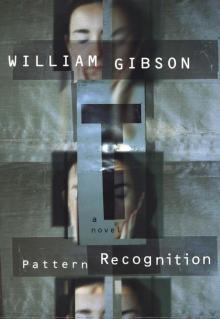 Pattern Recognition
Pattern Recognition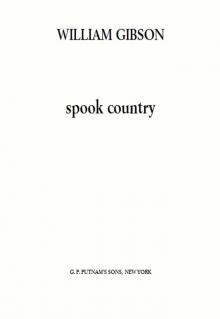 Spook Country
Spook Country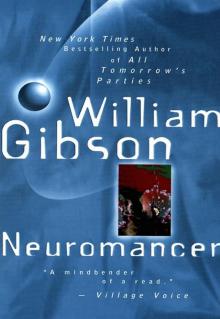 Neuromancer
Neuromancer Skinner's Room
Skinner's Room The Difference Engine
The Difference Engine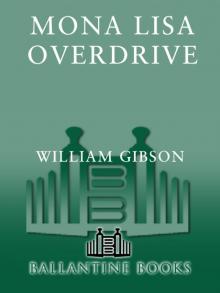 Mona Lisa Overdrive
Mona Lisa Overdrive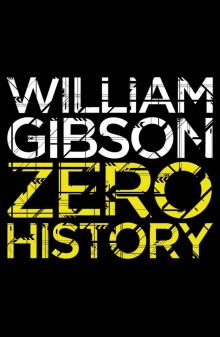 Zero History
Zero History The Peripheral
The Peripheral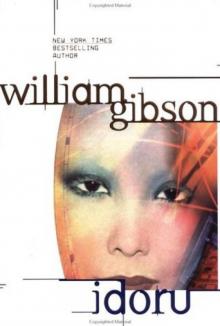 Idoru
Idoru Johnny Mnemonic
Johnny Mnemonic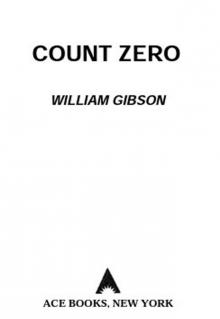 Count Zero
Count Zero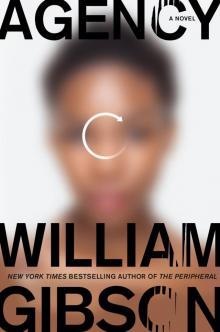 Agency
Agency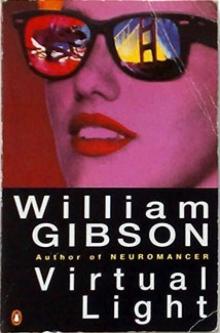 Virtual Light
Virtual Light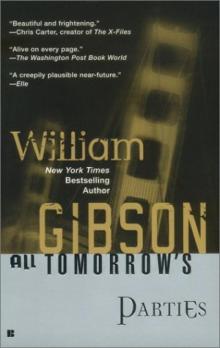 All Tomorrow's Parties
All Tomorrow's Parties The Miracle Worker
The Miracle Worker Disneyland with the Death Penalty
Disneyland with the Death Penalty Idoru tb-2
Idoru tb-2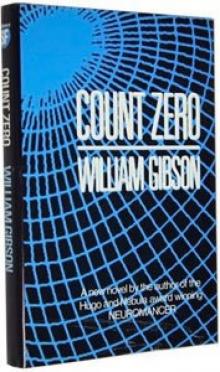 Count Zero s-2
Count Zero s-2 The Gernsback Continuum
The Gernsback Continuum New Rose hotel (tales)
New Rose hotel (tales)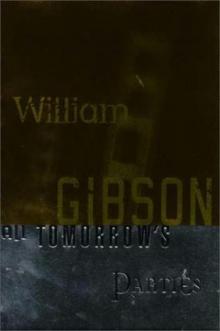 All Tomorrow's Parties bt-3
All Tomorrow's Parties bt-3 Hinterlands
Hinterlands Thirteen Views Of A Cardboard City
Thirteen Views Of A Cardboard City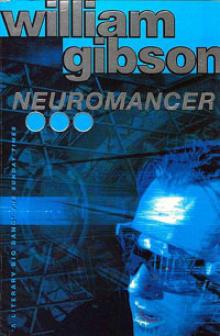 Neuromancer ts-1
Neuromancer ts-1 Virtual light b-1
Virtual light b-1